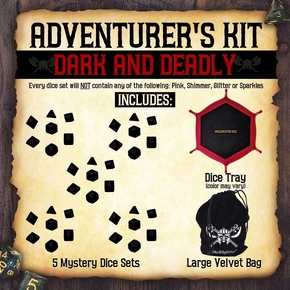
Ultimate Players Guide to Adventuring in Aquatic and Seafaring Campaigns
Table of Contents:
Sink or Swim: Ultimate Players Guide to Adventuring in Aquatic and Seafaring Campaigns
With the newly printed “Ghosts of Saltmarsh” there’s a lot of aquatic adventures on the horizon for a lot of players. Aquatic campaigns can get a bad rap though, from the difficulty and danger of fighting underwater to poorly run campaigns where players end up as little more than parts of boats (IS IT FLOTSAM OR IS IT JETSAM???). The sea is calling, and by following just a couple tips you can break waves rather than just treading water.
Uncharted Waters
Merfolk, pirate treasure, long lost cities and monstrous sea creatures, aquatic and seafaring campaigns can take you off the edge of the map into new and exciting locales.
You can’t design a character for every situation, but you know the ocean will be there and you can be sure your DM will use it. 5th edition D&D streamlined underwater combat for the most part, but there are still some builds that will have trouble if battle beneath the waves is commonplace.
Firstly, if you go overboard, how do you plan on swimming? If you sink, how do you plan on breathing? Your DM is likely to provide you with water breathing potions or magical items for water breathing if he intends for a fully aquatic campaign, but for a more seafaring adventure, you may be expected to fend for yourself in the drink. Here’s the official 5e rules for suffocating:
“Suffocating
A creature can hold its breath for a number of minutes equal to 1 + its Constitution modifier (minimum of 30 seconds).
When a creature runs out of breath or is choking, it can survive for a number of rounds equal to its Constitution modifier (minimum of 1 round). At the start of its next turn, it drops to 0 hit points and is dying, and it can't regain hit points or be stabilized until it can breathe again.
For example, a creature with a Constitution of 14 can hold its breath for 3 minutes. If it starts suffocating, it has 2 rounds to reach air before it drops to 0 hit points.”
What this means for your character is that unless you’ve got a good expectation of getting a water breathing ability, a good Constitution score might be even more valuable than usual. It’s good advice in general, but avoid making Con your dump stat for any seagoing campaign.
For melee oriented players, you’ll want to keep the following rules in mind:
“When making a melee weapon attack, a creature that doesn’t have a swimming speed (either natural or granted by magic) has disadvantage on the attack roll unless the weapon is a dagger, javelin, shortsword, spear, or trident.”
You’re going to need to plan around this. Rogues and other Dexterity based melee fighters shouldn’t be too fazed by this, daggers and shortswords are their bread and butter. For strength based melee characters this will become more of an issue, as most of your high damage-die strength weapons are really nerfed underwater. Unless you’re playing a triton barbarian (which doesn’t sound half-bad now that I’m saying it) you’ll have to settle for two-handed wielding a spear or trident as your primary underwater battling tool of choice.
Speaking of tridents, it’s hard to think of a weapon that stylistically fits better in an aquatic setting. It’s a shame that the trident is strictly worse than a spear in 5th edition. Tridents are statistically identical to spears in 5e, except they are martial weapons (fewer classes can effectively wield it) and it costs slightly more gold. IRL, tridents are useful for catching your enemy’s weapon and disarming them. 5e lacks any universal disarming rules, and this is probably why the trident feels underwhelming. If you want to run a trident wielding master in your next seafaring campaign, ask your DM about allowing a minor improvement to the trident such as adding a disarming ability or increasing it’s damage die by a step.
Ranged fighting underwater has some restraints as well:
“A ranged weapon attack automatically misses a target beyond the weapon’s normal range. Even against a target within normal range, the attack roll has disadvantage unless the weapon is a crossbow, a net, or a weapon that is thrown like a javelin (including a spear, trident, or dart).”
Obviously, your pinpoint longbow sniper is going to have some trouble, but this is honestly less of a problem than it may seem at first. Unless you specifically made a character for long range sniping, this only affects shots that were going to be at disadvantage anyway. It makes the bad shots impossible but doesn’t actually do anything to the good shots. Normal range for a longbow is 150 feet, and a shortbow has 80 feet. I’ve found this most often comes up with hand crossbows, which have a mere 30 foot normal range. Just keep your range in mind while you roll up a marksman in your next aquatic adventure.
Finally we arrive at the magic users, and here it all gets a bit wonky because with 5e’s streamlining, nothing in the rules as written really addresses underwater spellcasting. There’s a ton of very important distinctions and there’s nothing to really do but ask your DM.
Does water count as an obstruction to a fireball?
Would it explode in my hand?
Does fire even work underwater?
The real kicker is verbal components. There’s a lot of back and forth but depending on how your DM rules, casting spells that require verbal components underwater may be impossible. Before you roll up a spellcaster, figure out with your DM exactly how they plan on ruling aquatic spellcasting.
Finally, there’s one big problem to aquatic combat, your movement speed is reduced:
“While climbing or swimming, each foot of movement costs 1 extra foot (2 extra feet in difficult terrain), unless a creature has a swimming or climbing speed.”
This means that without a swim speed (gained naturally or magically) you’re essentially moving through difficult terrain while in water, and SUPER difficult terrain if the water is choppy. Try and wrangle up a swim speed because it’s going to be rough otherwise.
All of this sounds horrible right? A set of extra restrictions on your ability to fight right? Well it comes with a pretty amazing trade-off, flight! Well, sort-of flight. It’s not identical, but in an aquatic combat situation you and your party are essentially flying. This “free flight” is amazing and rife with ways to abuse it tactically. Don’t underestimate the versatility of attacking a problem from all angles.
It also, unfortunately comes with a bigger negative, that is the opposite of flight, which is falling (sinking). In very deep water things can go horribly wrong quickly if you’re not able to get to something that’s falling to the ocean floor.
Don’t Be the Boat Character
The new Ghosts of Saltmarsh book for 5e D&D created new streamlined rules for ships and other vehicles. It may be tempting to try and work your character’s story around ships, or your abilities around naval combat (though in 5e, it’s hard to design a character too badly). Trust me, you don’t want to be the boat person. I’ve seen a few variations, where players build around siege weapons, or airships, but the results tend to be the same.
Campaigns are complicated stories, and it’s unlikely that in any campaign beyond a 1-shot your situation will remain the same forever. Try not to rely on things outside of your character remaining consistent. It feels awful to build a character who’s all about ships only to get shipwrecked or teleported into a desert in the 2nd session. Your DM can take you anywhere and it’s not wise to get too invested in your ship, DMs love to wreck ships.
Have a Downtime Plan
This is good advice for any campaign, but it’s especially true in seafaring campaigns that often have weeks or even months of downtime sailing to far-off destinations. Have a downtime plan. It doesn’t have to be anything particularly useful (though that’s great if it is) but you should figure out how your character would spend large amounts of free time.
Depending on your DM’s personal item creation rules, you could even use this copious quantity of downtime to make some useful magic items. I recommend taking a look at “Unearthed Arcana: Downtime”, which contains the current “official” rules for crafting magic items. They are restrictive to say the least, but long sea voyages are about the only times a player can reasonably fit in the 50 workweeks to make a half-decent magic item.
Also from “Unearthed Arcana: Downtime”, we get great uses for your tool proficiencies that most people seem to forget about. Create life-saving potions of healing and antitoxins with your herbalism kit. Patch up and repair your party’s armor with your leatherworker’s tools, (or just make some fetching boots for everybody out of that sea dragon). Tinker and craft new weapons and armor with your smith’s tools (or just make some fancy rings).
Even if your character doesn’t make something “useful”, you can still do great flavorful things with your character. Have him carve scrimshaw or write new sea-shanties, ink themselves with a new tattoo or write tearful letters to lovers now a world away. Bottom line, when your DM says “you sail for the next 2 months” have something interesting at the ready that would occupy your character’s time.
Enjoy this Guide? You May Also Like:
Thinking about other classes? Check out our giant list of D&D 5e Tools and Tips here.
Hungry for Adventure? Your group will love these D&D Game Night Snack Recipes
New to find a D&D Group? Check out our guide on How to Find a D&D Group.
Disclaimer
Last updated: January 27, 2019
The information contained on www.SkullSplitterDice.com website (the "Service") is for general information purposes only.
Blueshift Nine, LLC assumes no responsibility for errors or omissions in the contents on the Service.
In no event shall Blueshift Nine, LLC be liable for any special, direct, indirect, consequential, or incidental damages or any damages whatsoever, whether in an action of contract, negligence or other tort, arising out of or in connection with the use of the Service or the contents of the Service. Blueshift Nine, LLC reserves the right to make additions, deletions, or modification to the contents on the Service at any time without prior notice.
Blueshift Nine, LLC does not warrant that the Service is free of viruses or other harmful components.
Affiliate disclaimer
This affiliate disclosure details the affiliate relationships of Blueshift Nine, LLC with other companies and products.
Some of the links are "affiliate links", a link with a special tracking code. This means if you click on an affiliate link and purchase the item, we will receive an affiliate commission.
The price of the item is the same whether it is an affiliate link or not. Regardless, we only recommend products or services we believe will add value to our readers.
By using the affiliate links, you are helping support the Service, and we genuinely appreciate your support.
Affiliate advertising programs that the Service uses are:
- Amazon Services LLC Associates Program
- As an Amazon Associate, I earn from qualifying purchases.
- Blueshift Nine, LLC is a participant in the Amazon Services LLC Associates Program, an affiliate advertising program designed to provide a means for sites to earn advertising fees by advertising and linking to Amazon.com or endless.com, MYHABIT.com, SmallParts.com, or AmazonWireless.com.
- Pages on this Service may include affiliate links to Amazon and its affiliate sites on which the owner of this Service, Blueshift Nine, LLC, will make a referral commission.

Disclaimer
Last updated: January 27, 2019
The information contained on www.SkullSplitterDice.com website (the "Service") is for general information purposes only.
www.SkullSplitterDice.com is a participant in the Amazon Services LLC Associates Program, an affiliate advertising program designed to provide a means for sites to earn advertising fees by advertising and linking to Amazon.com. (source: Section 5)
Blueshift Nine, LLC assumes no responsibility for errors or omissions in the contents on the Service.
In no event shall Blueshift Nine, LLC be liable for any special, direct, indirect, consequential, or incidental damages or any damages whatsoever, whether in an action of contract, negligence or other tort, arising out of or in connection with the use of the Service or the contents of the Service. Blueshift Nine, LLC reserves the right to make additions, deletions, or modification to the contents on the Service at any time without prior notice.
Blueshift Nine, LLC does not warrant that the Service is free of viruses or other harmful components.
Affiliate disclaimer
This affiliate disclosure details the affiliate relationships of Blueshift Nine, LLC with other companies and products.
Some of the links are "affiliate links", a link with a special tracking code. This means if you click on an affiliate link and purchase the item, we will receive an affiliate commission.
The price of the item is the same whether it is an affiliate link or not. Regardless, we only recommend products or services we believe will add value to our readers.
By using the affiliate links, you are helping support the Service, and we genuinely appreciate your support.
Affiliate advertising programs that the Service uses are:
- Amazon Services LLC Associates Program
- As an Amazon Associate, I earn from qualifying purchases.
- Blueshift Nine, LLC is a participant in the Amazon Services LLC Associates Program, an affiliate advertising program designed to provide a means for sites to earn advertising fees by advertising and linking to Amazon.com or endless.com, MYHABIT.com, SmallParts.com, or AmazonWireless.com.
- Pages on this Service may include affiliate links to Amazon and its affiliate sites on which the owner of this Service, Blueshift Nine, LLC, will make a referral commission.



